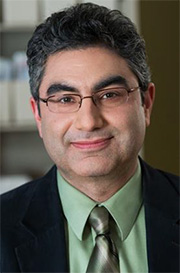Deciphering the Effects of Intercellular Communication via Tunneling Nanotubes on Cancer Cell Invasion and Chemoresistance
| When |
September 12, 2019
11 a.m. to 12 p.m.
LivestreamTo livestream, please use the Chrome browser. 
Emil Lou, M.D., Ph.D., FACP Abstract Intercellular communication is vital to the ecosystem of cancer cell organization and invasion. Tunneling nanotubes (TNTs) represent an especially unique form of cell protrusion that facilitates direct long-range cell-to-cell transport of cargo, including microRNAs, mitochondria, and others. The potential functions of TNTs in cancer have only begun to be characterized in recent years, and efforts to develop better methods for identifying unique properties and mechanisms of TNTs are an area of active investigation. In addition to facilitating cellular crosstalk among cancer cells, TNT-mediated communication can also occur between malignant and stromal cells and can lead to changes in gene regulation that propagate the cancer phenotype, as well as promotion of drug resistance through a novel form of drug efflux. The Lou Lab has imaged TNTs in intact tumors and characterized the function of TNTs in vitro, including recently reported work describing intercellular transfer of oncogenic RAS. About Dr. Lou After completing undergraduate studies in biochemistry at SUNY College at Geneseo, Dr. Lou received his M.D. and Ph.D. degrees (Microbiology and Immunology) from SUNY Upstate Medical University in 2004. He performed his residency training in Internal Medicine at Duke University Medical Center and then subsequently completed his Medical Oncology and Hematology fellowship at the Memorial Sloan-Kettering Cancer Center in 2010. He also completed an additional fellowship in Neuro-Oncology at the Preston Robert Tisch Brain Tumor Center at Duke. Dr. Lou’s lab investigates cellular and molecular mechanisms of emergence of drug resistance in invasive, difficult-to-treat forms of cancer, with particular focus on intercellular communication via tunneling nanotubes. He leads the University of Minnesota’s Molecular Tumor Board and is the Medical Director of the Masonic Cancer Center’s Clinical Trials Office. Hosted by the OCSSB M2CH Center NCI Cancer Systems Biology Consortium |
|---|---|
| Where |
Campus:
Building:
2730 S. Moody Avenue
Portland,
Oregon
97201
Room: 1S040 (learning studio)
|
| Contact Information |
Livestream
To livestream, please use the Chrome browser.
Livestream link

Emil Lou, M.D., Ph.D., FACP
Assistant professor of medicine
University of Minnesota-Twin Cities
Abstract
Intercellular communication is vital to the ecosystem of cancer cell organization and invasion. Tunneling nanotubes (TNTs) represent an especially unique form of cell protrusion that facilitates direct long-range cell-to-cell transport of cargo, including microRNAs, mitochondria, and others. The potential functions of TNTs in cancer have only begun to be characterized in recent years, and efforts to develop better methods for identifying unique properties and mechanisms of TNTs are an area of active investigation. In addition to facilitating cellular crosstalk among cancer cells, TNT-mediated communication can also occur between malignant and stromal cells and can lead to changes in gene regulation that propagate the cancer phenotype, as well as promotion of drug resistance through a novel form of drug efflux. The Lou Lab has imaged TNTs in intact tumors and characterized the function of TNTs in vitro, including recently reported work describing intercellular transfer of oncogenic RAS.
About Dr. Lou
After completing undergraduate studies in biochemistry at SUNY College at Geneseo, Dr. Lou received his M.D. and Ph.D. degrees (Microbiology and Immunology) from SUNY Upstate Medical University in 2004. He performed his residency training in Internal Medicine at Duke University Medical Center and then subsequently completed his Medical Oncology and Hematology fellowship at the Memorial Sloan-Kettering Cancer Center in 2010. He also completed an additional fellowship in Neuro-Oncology at the Preston Robert Tisch Brain Tumor Center at Duke.
Dr. Lou, a diplomate of the American Board of Internal Medicine, is board certified in Medical Oncology and Internal Medicine. In addition, he is also board certified in Neuro-Oncology through the United Council for Neurologic Subspecialties. He joined the faculty in the Division of Hematology, Oncology and Transplantation in 2011 and is a member of the Masonic Cancer Center, University of Minnesota.
Dr. Lou’s lab investigates cellular and molecular mechanisms of emergence of drug resistance in invasive, difficult-to-treat forms of cancer, with particular focus on intercellular communication via tunneling nanotubes. He leads the University of Minnesota’s Molecular Tumor Board and is the Medical Director of the Masonic Cancer Center’s Clinical Trials Office.
Hosted by the OCSSB M2CH Center NCI Cancer Systems Biology Consortium